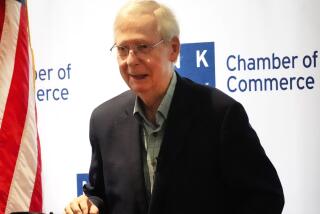Yeltsin Healthy, His News Agency Reports : Russia: Official announcement is intended to soothe nerves in Moscow after rumors of a coup in the works.
- Share via
MOSCOW — Boris N. Yeltsin’s health is just fine, thank you, and any claims to the contrary are nothing but “intentional disinformation,” the Russian president’s press service declared Monday.
The announcement, carried by the official Itar-Tass news agency, may have sounded comical but it had a serious aim: to quell mounting jitters in the Moscow media and government circles over reports that another Russian coup may be brewing, this one based on claims that Yeltsin is ailing.
Warnings of impending coups come every few months amid Russia’s general instability.
They usually blow over quickly--except for the two times, in August, 1991, and last October, when Russian politics did descend into violence.
But it is rare that a putsch scenario offers so much detail--including the names of purported plotters--and gains so much weight that the mainstream Russian media decide to inform the public of it.
This time, even officials acknowledged that rumors are rampant.
Alexei Ilyushenko, Russia’s acting prosecutor general, launched an investigation Monday into reports that “a group of government figures” is “intending to remove Boris Yeltsin from power.”
If press accounts of the purported coup-in-the-making prove untrue, the prosecutor general will look into bringing libel charges against those who aired them, officials told the Interfax news agency.
The current coup scenario appeared in the Obshchaya Gazeta on Friday and has been discussed at length on Russian television. It hinges on the dubious state of Yeltsin’s health, which explains the presidential press service’s eagerness to confirm his physical well-being.
Presidential spokesmen also made sure to inform Interfax that Yeltsin, who is now on a two-week working vacation on the Black Sea, is relaxing but remaining active, including taking a hike in the mountains.
The plot, published in the Obshchaya Gazeta, was a reprint of a memorandum supposedly making the rounds in the Parliament. It was marked “Confidential” and also, rather strangely, “Attention! When a new version appears, the old one is canceled.”
The memo, dated last Wednesday, said the coup would begin with a television broadcast announcing that Yeltsin’s health had worsened, a contention that would be backed up with a film that is supposed to document his weakness.
Under Russia’s constitution, if the president is deemed physically unfit to rule, the prime minister takes over for three months and then new elections are held.
Among alleged plotters named in the memo were Moscow Mayor Yuri M. Luzhkov, First Vice Premier Oleg N. Soskovets--who has already denied any such intentions and appealed to the prosecutor general to clear his name--and chief of the army’s general staff, Mikhail Kolesnikov.
Most of those named are considered members of the “pragmatic center,” men of action rather than ideologists.
The elaborate scenario raised general political anxiety to the point that the daily Izvestia noted that when Prime Minister Viktor S. Chernomyrdin flew to the Black Sea resort where Yeltsin is resting on Monday, rumor in Moscow had it that he was going to accept the reins of power.
According to Izvestia, it was those reports that led Yeltsin’s spokesman to issue the announcement that Yeltsin was healthy. Chernomyrdin had to get Yeltsin’s approval for the state budget promptly so Parliament could begin discussing it, the official line went.
“There is every reason to consider that the main event last week was that a coup did not take place,” Izvestia noted wryly.
Yeltsin, 63, said when he went on vacation last week that he was still trying to get over a bout of the flu.
But even his relative openness lately about the state of his health has failed to quell persistent speculation that he suffers from alcoholism, chronic liver problems, terrible back pain and other complaints.
The rumors are bolstered by Yeltsin’s habit of periodically disappearing from view for days or weeks at a time, sometimes just when he is needed most.
Also, things have seemed to be slipping away from the Russian president recently; most striking was the staff disorganization that prevented him last month from blocking Parliament’s decision to issue an amnesty, dropping all charges against all his worst political foes, several of whom were in jail for their roles in October’s battle over the Russian White House.
Yeltsin’s absence always tends to fuel rumors of a coming coup. This time around was especially reminiscent of the circumstances of the Soviet coup attempt in August, 1991, when then-President Mikhail S. Gorbachev had gone to the Crimea on vacation, and hard-line plotters announced that he had fallen ill and that they were taking over.
But Russian politics have changed deeply since then, and Moscow media interpreted the virulence of this spell of coup jitters as actually a new sort of pre-election campaign.
Nikolai Svanidze, a commentator for Russian Television, pointed out that all the high officials accused by the memo of being would-be coup collaborators were strong candidates in the next presidential race, slated for 1996. Perhaps the push to discredit them is already under way, he said.
Izvestia analyzed Moscow’s recurring coup fever on a deeper level, reminding readers that, although Russia is a democracy on paper, it has no stable base because it has not worked out a normal division of state power with the required checks and balances. Virtually all power still lies with the president. Naturally, whenever the president looks weak, the whole structure appears to totter.
More to Read
Sign up for Essential California
The most important California stories and recommendations in your inbox every morning.
You may occasionally receive promotional content from the Los Angeles Times.













